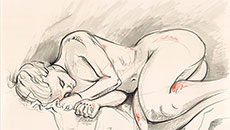TRURO, N.S. — Two Newfoundland families have launched negligence lawsuits against the federal correctional service over the separate deaths of two women in a Nova Scotia penitentiary, alleging the prison failed to provide proper physical and mental health care in both cases.
Veronica Park and Camille Strickland-Murphy, both from Newfoundland and Labrador, died months apart in 2015 at the Nova Institution for Women in Truro.
Their families have filed lawsuits earlier this year before the Nova Scotia Supreme Court in Truro seeking damages and alleging negligence on the part of Correctional Service Canada, with Ottawa lawyer Frances Shapiro Munn leading both cases.
None of the allegations made in the suit have been proven in court, and a statement of defence has not yet been filed by Ottawa.
The agency says it takes the death of any inmate seriously, and took "immediate action" following the deaths to investigate.
In the case of 22-year-old Strickland-Murphy, the lawsuit says she committed suicide by suffocating herself with a plastic bag.
The document says Strickland-Murphy, who was serving a three-year sentence for attempted robbery of a pharmacy, was previously attacked twice by another inmate and the injuries and lack of treatment added to her diagnosed mental health problems.
The statement says that in March of last year the young woman set her own leg and her room on fire, and after that she was reclassified as a maximum security prisoner even though some social workers had recommended she be treated in a mental health unit at the hospital.
According to the court document, the inmate tried to hang herself on July 20, was hospitalized and then returned to the prison, without her family being informed.
She died in her cell in the second suicide attempt eight days later.
Kim Pate, executive director of the Canadian Association of Elizabeth Fry Societies, says the cases suggest Corrections hasn't followed up on coroner jury's recommendations on health care made after the death of Ashley Smith, an emotionally disturbed 19-year-old who died in 2007 after tying a strip of cloth around her neck.
"If those recommendations had been followed up on, I think it's conceivable the deaths could have been prevented," she said.
Pate said that the coroner's inquest had raised concerns about the inadequacy of health care for both physical and mental illnesses suffered by women in prison.

"Where people have mental health issues they should be transferred to a mental health facility rather than being kept in segregation or both ... Camille Strickland-Murphy wasn't able to access adequate mental health," said Pate.
The family of Veronica Park, a 38-year-old aboriginal woman from Corner Brook, said in its statement of claim that she arrived at the prison in 2014, and that she had pre-existing mental health issues due to sexual and physical abuse as a child.
The document says she traded drugs with other inmates to soothe some of her mental distress, and was prescribed anti-depressants and methadone by a prison doctor.
She was also reclassified as a maximum security prisoner, which reduced her contact with family members, before being returned to medium security.
According to the records, she went to the prison's clinic on eight different days, and on the last visit a nurse recorded she had a sore throat, cough and aches in her body. Later that night of April 23, 2015, she returned to the clinic and received a "puffer."
"In spite of the two visits and although Veronica was clearly in significant respiratory distress, neither of the two nurses saw fit to consult with a doctor or refer Veronica to a doctor or other emergency services," says the statement of claim.
She was found gasping in her cell the next day, rushed to hospital and diagnosed with bilateral pneumonia, says the statement of claim. She died later that day.
The medical examiner concluded Park died of pneumonia, and tests also showed she tested positive for an antibiotic-resistant strain of MRSA, according to the plaintiff.





